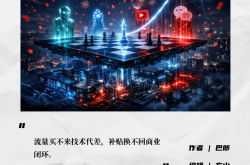“Luxury Brands” Face Challenges Too: Mercedes-Benz Struggles to Keep Pace
![]() 08/29 2025
08/29 2025
![]() 707
707
Lead
In recent years, the Chinese automobile market has seen fierce competition, posing survival crises not only to new entrant automakers but also to global luxury giants, including Mercedes-Benz. If this trend continues, the question of how to “survive” will no longer be exclusive to newcomers.
Produced by|Heyan Yueche Studio
Written by|Zhang Dachuan
Edited by|He Zi
Voices against the intense competition within the automotive industry are growing louder.
Recently, Ola Källenius, the global CEO of Mercedes-Benz, shared his views on the competitive landscape in China's automobile market during an interview with German media. Källenius bluntly stated that the current Chinese market has become a "Darwinian" environment, with over a hundred auto companies vying for dominance. This has resulted in electric vehicles being sold at lower prices than fuel vehicles, leading to "significant cash consumption and value destruction." He admitted that this price reduction is detrimental to all auto companies.
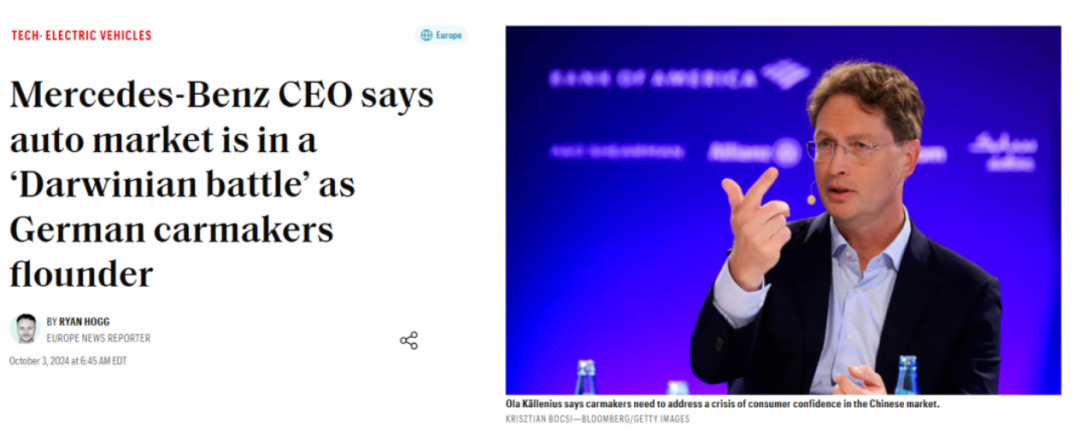
△Mercedes-Benz Global CEO Laments Fierce Competition in China's Market
Currently, Mercedes-Benz, like other multinational auto giants, faces significant challenges. According to Mercedes-Benz's first-half financial report, its global net profit fell by 55.8% year-on-year to 2.7 billion euros, with the second-quarter net profit plummeting by 68.7%. Besides underperforming in the Chinese market, the 25% tariff imposed by the United States on European vehicle exports cost Mercedes-Benz a loss of 360 million euros. As the leader of Mercedes-Benz, Källenius must navigate the company out of its current predicament as swiftly as possible.
Mercedes-Benz Raises the Alarm in China's Auto Market
Källenius's radical remarks are closely tied to Mercedes-Benz's disappointing performance in the Chinese market.
In the first half of 2025, Mercedes-Benz's sales in China plummeted by 14%, with the decline expanding to 19% in the second quarter, far exceeding the global average of 8%. In the recently concluded July, Mercedes-Benz's sales in China were only 26,653 units, a month-on-month drop of over 40%. While July is traditionally a slow month for auto sales, Mercedes-Benz's sales hit a five-year low, falling below the 27,000-unit mark for the first time. In contrast, Mercedes-Benz's two main competitors in China, BMW and Audi, sold 40,190 and 37,600 units respectively last month, significantly outperforming Mercedes-Benz.
Regarding specific model sales, last month, the Mercedes-Benz E-Class sold 7,700 units, the GLC sold 7,514 units, and the C-Class sold 6,870 units. These three fuel vehicles together accounted for over 80% of Mercedes-Benz's monthly sales, serving as the backbone of the brand. Among the remaining models, only the GLB sold 1,150 units, while other models failed to reach the four-digit mark.
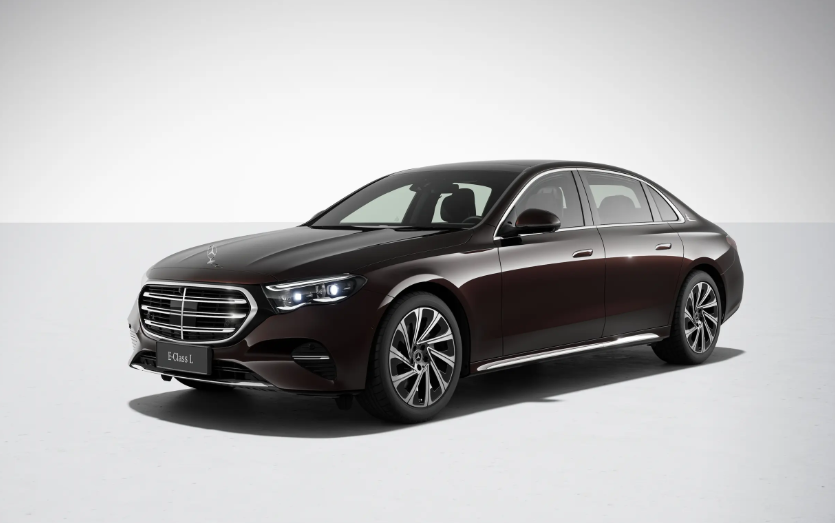
△The E-Class Led Mercedes-Benz Sales in July with 7,700 Units
To boost sales, Mercedes-Benz has resorted to price wars. Some domestic dealers of Mercedes-Benz are willing to sell electric vehicles like the A-Class sedan and EQA/EQB at half price. The quoted price for the Mercedes-Benz A-Class can be as low as 125,600 yuan, while the price range for the EQA/EQB has also dropped to 160,000 yuan. However, even so, only 191 EQA units were sold in the entire first half of the year. This indicates that Mercedes-Benz's price war strategy in the domestic market has largely failed, and half-priced Mercedes-Benz vehicles still struggle to convince consumers to purchase them.
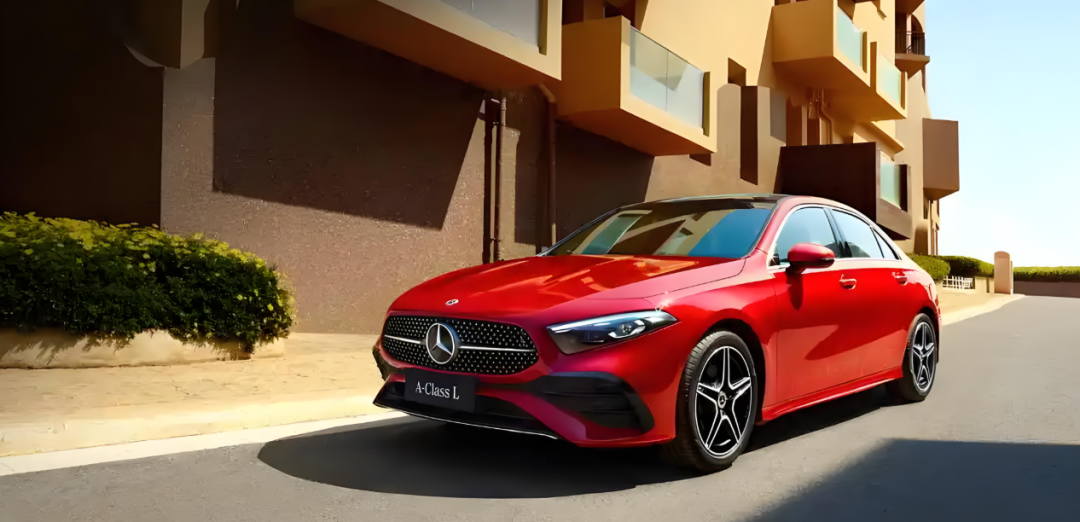
△Some Dealers Offer the Mercedes-Benz A-Class for Just 125,600 Yuan, Shocking Everyone
Why Is Mercedes-Benz Losing Popularity in China?
There are two main reasons for Mercedes-Benz's declining popularity: internal and external factors.
Externally, independent brands are increasingly gaining recognition from domestic consumers through new energy and intelligent features. Whether it's new forces like Hongmeng Zhixing "Wujie", Li Auto, NIO, or high-end sub-brands incubated by traditional automakers like Zeekr, BYD look up at, and FANGCHENGBAO, they are all constantly challenging the market share held by traditional luxury brands like Mercedes-Benz. In contrast, Mercedes-Benz's sluggish electrification strategy has left its models lagging behind domestic automakers in terms of product strength. For instance, the EQA is a product born from an outdated "fuel-to-electric" platform and is completely unable to compete with domestic counterparts in terms of product prowess.
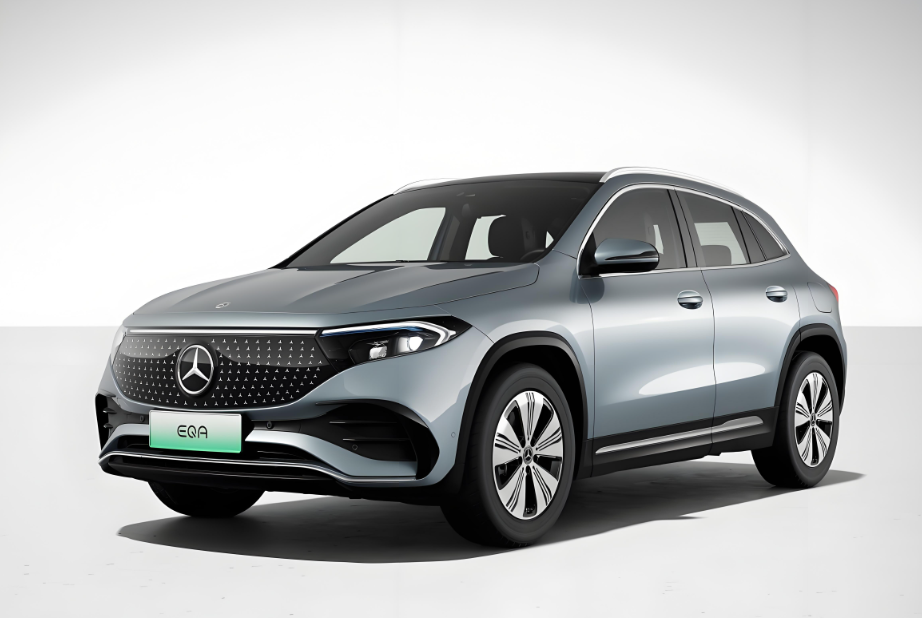
△The "Fuel-to-Electric" EQA Lacks Competitiveness in the Domestic Market
On the other hand, Mercedes-Benz has yet to shed its arrogant stance from the fuel vehicle era in China. In the era of intelligent connectivity, Mercedes-Benz charges 1,498 yuan for a three-year renewal of its Gaode navigation system, 798 yuan for an annual remote vehicle control fee, and 4,999 yuan per year for a subscription to the rear-wheel active steering function, which merely upgrades the maximum steering angle from 4.5° to 10°. In contrast, these features are considered basic and free in domestic independent brands.
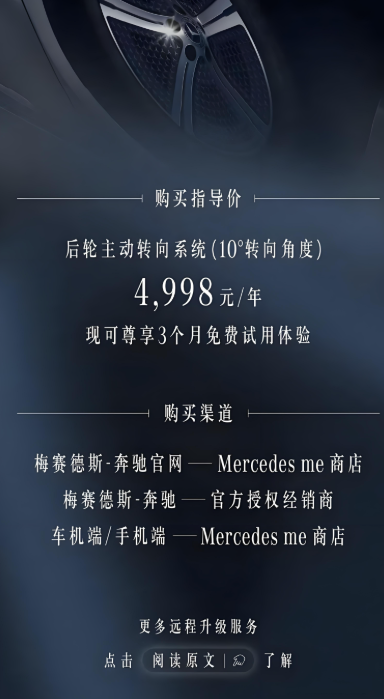
△Additional Fees Make Mercedes-Benz Stand Out in the Domestic Market
In fact, Mercedes-Benz is not naive; this situation arises from its own considerations and calculations.
Unlike domestic automakers that can sell cars at a loss, global automakers like Mercedes-Benz view profitability as a crucial indicator for pricing. Therefore, Mercedes-Benz utilizes the lowest-cost fuel-to-electric platform and charges for many additional features. Many domestic brands strive to squeeze every bit of cost from the supply chain and within their own organizations, even offering many additional services at a negative gross margin, to increase their market share. However, once capital chain issues arise, bankruptcy becomes inevitable.
Is Mercedes-Benz's Darkest Period Behind It?
For Mercedes-Benz, the darkest period may be over.
With the European Union and the United States reaching an agreement on tariffs, the previous 25% tariff will be reduced to 15%. Although this is still much higher than the previous rate, it is generally within the tolerable range for automakers. In the future, by gradually expanding production in the United States and leveraging the significant product advantages of European automakers, especially luxury brands like BBA, in the passenger vehicle sector, the disturbance caused by tariffs can be gradually mitigated.
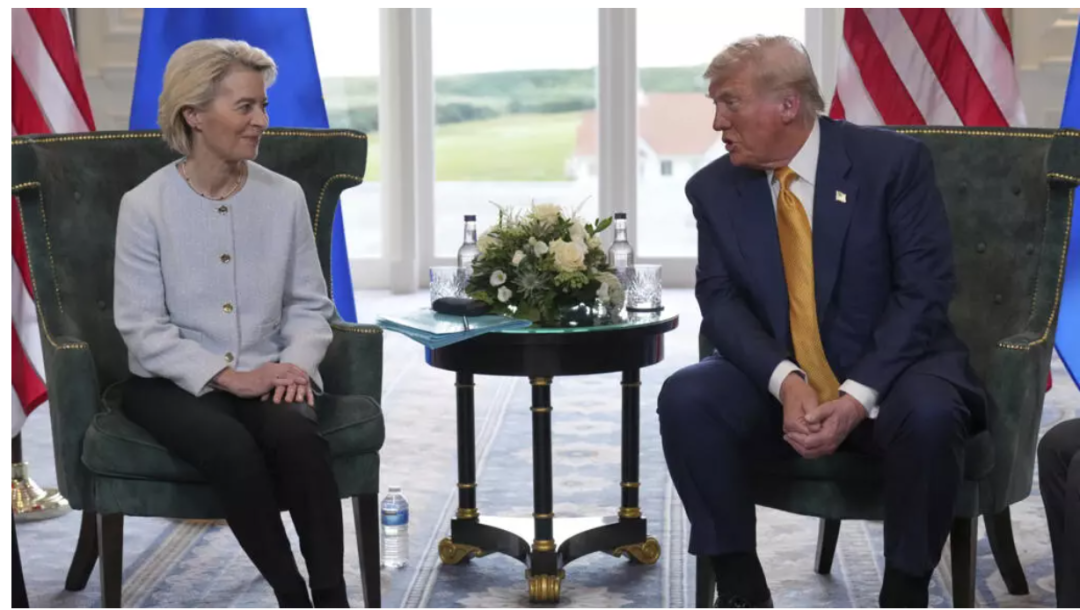
△The European Union and the United States Have Reached a Tariff Agreement
Addressing the issue of insufficient competitiveness in the Chinese market will become one of Källenius's primary tasks moving forward. Although Källenius stated that "Mercedes-Benz does not want to seize market share in China at all costs because the pricing strategy of maintaining high sales through large-scale promotions is wrong," it is highly likely that Mercedes-Benz will adjust terminal discounts based on market performance in the next step. Additionally, Mercedes-Benz is leveraging the development of the new CLA pure electric sedan to reverse the impression of insufficient product strength. With a pure electric range of 866 km, support for 800V supercharging, and intelligent driving developed in collaboration with Momenta, as long as the pricing of this model is reasonable, it is possible that Mercedes-Benz may replicate the success of Dongfeng Nissan's Ariya and create a best-selling model.
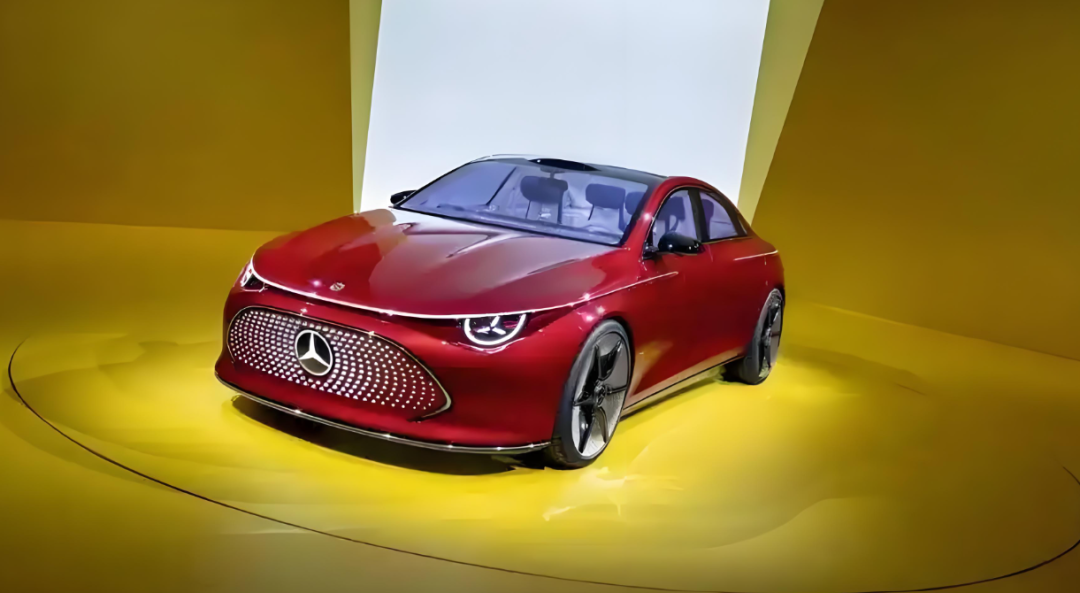
△Mercedes-Benz Hopes to Achieve a Strong Comeback with the New CLA
Commentary
Källenius's reference to "Darwinian competition" has been interpreted by many in China as Mercedes-Benz being unable to compete with independent brands and struggling to keep pace with other foreign automakers. However, in reality, many domestic independent brands are also struggling to keep up. With the anti-involution sentiment in China, models like the Yinhe M9 and NIO's new ES8 continue to push the boundaries of price limits with each new car. Currently, the state of China's automobile market is unhealthy. How to truly halt automakers from engaging in intense competition is an urgent issue for the automotive industry to address.
(This article is originally created by Heyan Yueche and cannot be republished without authorization)






